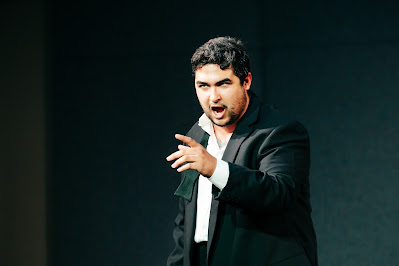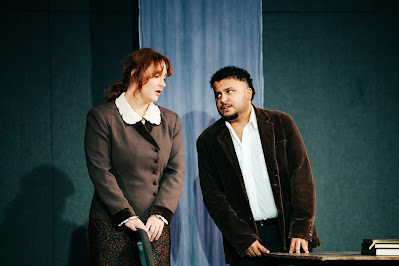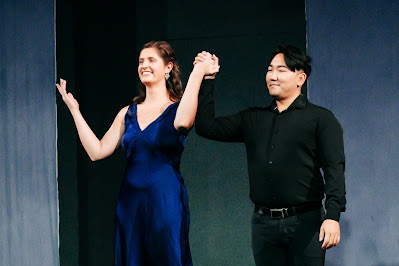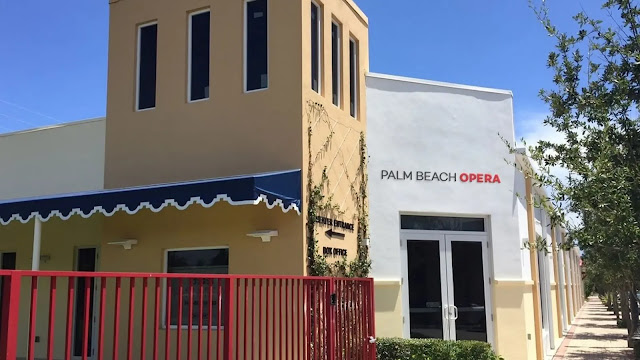 |
| Verdi: Rigoletto – Bernardo Medeiros (Rigoletto) Palm Beach Opera (Photo: Coastal Click Photography) |
Opera Up-Close: Unveiling the dramatic process with Paul Curran; Paul Curran, Palm Beach Opera; The Cornelia T. Bailey Opera Center; Palm Beach, Florida
14 December 2024, Robert J Carreras
For his latest Letter from Florida, Robert J Carreras eavesdrops on director Paul Curran working on opera scenes with young artists from Palm Beach Opera. Opera Up Close featured scenes from seven operas. Stage director Paul Curran, who was artistic director of the Norwegian National Opera from 2007 to 2011, provided expert commentary about each scene.
“Greek theatre is, for me, an examination of what it is to be an human being. It is the basis of all theater. It is the basis of all film…of cinema as a whole.” In a video precis of Phaedra, based on Euripides’ Hippolytus, Paul Curran provides the structure on which to frame his conceptual machinations of stagecraft and how he approaches the work he does with opera-artists in training. So it is that Curran, along with members of Palm Beach Opera’s Young Artists Program, set us off on a vivid voyage of self-discovery via a tilt-a-whirl of emotions.
Workshops like these – open to the public and with experts narrating, setting up scenes and ad-libbing – work toward the furtherance of opera-awareness. They attest to the healthy state of healthy competition in opera today. They serve to demonstrate how opera has moved another step on from prima la voce into the internalization of acting as a rightful and equal part of the artform. For those farther along in an opera-loving journey, these amount to positive developments – opera has a future.
Opera training has also moved on from the early days of singers fending for themselves after training programs. Training programs have become support systems for even polished artists, in some cases on into careers but with calendars still too open, and they at-risk for abandoning this aspiration. Opera training at Palm Beach Opera (PBO) is split into a Studio Program, the Young Artist Program and the Apprentice Artist Program. Now with 15 participants, PBO can just about field a cast for Ghost of Versailles; those numbers are not the norm. In scarcely staged and suggestively costumed scenes in a black-box theatre at The Cornelia T. Bailey Opera Center, artists get a chance to learn, and to teach.
“This narrative stimulates introspection by challenging us to decipher the Divine, or destructive, nature of our thoughts and emotions…of the complex tapestry of human experience.”
Rival affections, drives and motivations such that are found in each of the scenes on tap here, are part of the human experience. The portrayals selected for artistic appraisal give us a glimpse into who we are – whether we make conscious decisions or get entrapped or beguiled into a raucous ride. You are lucky if those rides can be laughed at later.
In the scene from Gaetano Donizetti’s L’elisir d’amore leading up to “Venti scudi,” Pennsylvania’s Ben Strong employs his impressive bass-baritone energetically, in Belcore’s sly study on what some are willing to do for a buck, twenty of them.
“We do this by telling a story for the general public…for those that play themselves.”
Carlisle Floyd’s Susanah is a torturing trip of large emotions in and of itself, and soprano Saane Halaholo (Tongan American) and bass-baritone Dylan Gregg (Maryland) are well-cast to fill those emotions; in opera, large voices are called on for large emotions. Gregg’s performance was also large in that he appeared to have lots to draw on to transmit his charge. Gregg’s facility with this text and its exposition are noteworthy, as is the quality of his voice. Both artists seemed comfortable about the stage, using it purposefully and artfully.
“The story becomes a mirror that reflects the intricate relationship between our inner self and the external forces that shape our actions.”
Curran’s blueprints for, and influence in, matters dramatic were in the results. His stage action is founded on artistic companionship, on the geometry – perhaps the metaphysics – of space and time, posture and proximity. There was considerable work to do in the two weeks Curran and these artists spent together; Curran is master at easy connection, which engenders trust. Trust is a vital element in cultivating dramatic involvement as a stage director.
“Acting is reacting…and imagining.”
 |
| Massenet: Werther – Ashlyn Brown (Charlotte), Ajit Persuad (Werther) Palm Beach Opera (Photo: Coastal Click Photography) |
How does a Guyanese young man in 2024 portray a German young man from the 1770’s? How does he play a man whose fate is sealed in death by his own hand? How does he do this while singing a difficult aria? Last I heard, English is the official language of Guyana, not French. If Ajit Persaud was more persuasive singing of Werther’s anguish and despair, he was not far off from a faithful familiarity with those emotions as thespian. His mostly fresh French helped his cause, and his tenor flashed fulgently through much of “Pourquoi me reveiller.”
It is perhaps poetic to have a soprano by the surname Seminario play the role of Suor Angelica – there are no coincidences, as Curran might say. It is certainly poetic to be teleported back to past performances of “Senza mamma,” reminiscences brought to fore poignantly by Ms. Seminario, and as so, instrumentally accompanied on phantasmal piano by Gregory Ritchie. Ritchie gave new life to Giovacchino Forzano’s “Ora che sei un angelo del Cielo” and “con un leggero scintillar di stella” with the twinkling (triplets) accents. Seminario released her child – and us – from her torment with a well-executed mezza voce A, “amor.” Seminario’s was no simple task – a mother turned nun, an abandoned child, an exquisite pain. A Levittown New Yorker, Seminario has this experience to count on, to summon forth ranges of related emotions – throughout her human life (the person she plays), her operatic life (the roles she plays), and back to her human life (the person she is becoming).
“This is the work that we do!”
Paul Curran and these young opera artists deserve to be pleased with what was accomplished in this tilt-a-whirl dramatic dizzy and tizzy, with an audience left equally enrapt and exhausted. They, stirred and shaken, climbed out of a ride full of twists of fate, dark foreboding, and impossible situational quandaries. As with Curran, this life, and its theatre, and its stage – it is all Greek to me.
 |
| Massenet: Manon – Lauren Carroll (Manon), Randy Ho (Des Grieux) Palm Beach Opera (Photo: Coastal Click Photography) |
Gaetano Donizetti – L’elisir d’amore
World premiere: Milan, 1832
Act II, scene III: “Venti scuidi” (Nemorino: Mathew Cerillo, Belcore: Ben Strong)
Music Director and Piano: Shelby Rhoades
Carlisle Floyd – Susannah
World Premiere: Tallahassee, 1955
Act II, scene III: “The trees on the mountains…I’m a lonely man, Susannah” (Susannah: Saane Halaholo, Blitch: Dylan Gregg)
Music Director and Piano: Shelby Rhoades
Jules Massenet – Werther
World Premiere: Vienna, 1892
Act II: “Ah! Mon courage m’abandonne…Pourquoi me reveiller” (Charlotte: Ashlyn Brown, Werther: Ajit Persaud )
Music Director: Anna Betka
Giuseppe Verdi – Rigoletto
World premiere: Venice, 1851
Act II: “Tutte le feste al tempio…Si, vendetta, tremenda vendetta” (Gilda: Maggie Kinabrew, Rigoletto: Bernardo Medeiros, Monterone: Mario Manzo, Usciere: Ben Strong)
Music Director: Anna Betka
Associate Music Director and Pianist: Connor Buckley
Giacomo Puccini – Suor Angelica
World Premiere: New York, 1918
Scene: “Nel silenzio di quei raccoglimenti…Senza mamma” (Suor Angelica: Alexis Seminario, La Zia Principessa: Margaret Shannon)
Music Director: Gregory Ritchie
Gioachino Rossini – Il barbiere di Siviglia
World Premiere: Rome, 1816
Act I, scene II: “Dunque io son” (Rosina: Allison Fahey (indisposed but acting), Figaro: Mario Manzo)
Voicing the part of Rosina: Ashlyn Brown
Music Director: Shelby Rhoades
Associate Music Director and Pianist: Connor Buckley
Jules Massenet – Manon
World Premiere: Paris, 1884
Act III, scene II (St. Sulpice): “Toi! Vous!…Ah! viens Manon, je t’aime!” (Manon: Lauren Carroll, Des Grieux: Randy Ho)
Music Director and Pianist: Anna Betka
 |
| The Cornelia T. Bailey Opera Center on 24th Street in West Palm Beach’s historic Northwood neighborhood. Palm Beach Opera’s new (2023) headquarters building (Photo: Palm Beach Daily News) |
Palm Beach Opera was founded in the summer of 1961 as the Civic Opera of the Palm Beaches. On January 29, 1962, at the Palm Beach High School Auditorium, the organization presented its first-ever production, La traviata, to a sold-out audience of 1,200 with a live chorus and 26-piece orchestra.
The blog is free, but I’d be delighted if you were to show your appreciation by buying me a coffee.
Elsewhere on this blog
- The songs of Robert Kahn: Florian Störtz & Aleksandra Myslek reveal some of the gems to be found in the output of a relatively forgotten composer forced into exile by the Nazis – concert review
- Satisfying, yet thought-provoking: Handel’s Messiah from Laurence Cummings and the Academy of Ancient Music – concert review
- He would stop writing if there was no-one to perform his music: for composer Stephen Goss’ his latest triple album is all about a celebration of collaboration – interview
- Mad, magical and mesmerising: Tom Coult’s Pieces that Disappear, his debut disc from NMC Records – record review
- The Quest: Inspired by Auden & Isherwoods’ The Ascent of F6, Nathan Williamson’s opera for London Youth Opera has a clear message – interview
- Fine-grained tone & classical style: Kyan Quartet in Beethoven, Schumann & Caroline Shaw at Conway Hall’s Sunday Concert Series – concert review
- Love Lines: deep emotions & island soundscapes in London Sinfonietta’s programme of contemporary Scottish music at Kings Place – concert review
- György Kurtág, Dietrich Fischer Dieskau & Christmas in Regensburg: three personal recordings projects for baritone Benjamin Appl – interview
- Engaging zest: Mike Leigh’s production of Gilbert & Sullivan’s The Pirates of Penzance at ENO with a cast mixing innocence & experience – opera review
- English lyricism and dramatic power: the varied songs of Thomas Pitfield from James Gilchrist and Nathan Williamson – record review
- Home









